Police have fired rubber bullets and tear gas at protesters in Hong Kong where anger at a new extradition bill has spilled over into violence.
Protesters have blocked key roads around government buildings and threw bricks and projectiles at police.
The government is still pushing for the bill which would allow extradition to mainland China and it is expected to pass its final vote on 20 June.
But the Legislative Council (LegCo) has now delayed its second reading.
The pro-Beijing LegCo said Wednesday's scheduled meeting would instead be held at an unspecified "later time".
- Hong Kong-China extradition plans explained
- Hope and defiance on the streets of Hong Kong
- Watch: Why people are taking to the streets
This is the first time rubber bullets have been used in Hong Kong for decades.
What's happening?
Protests had been largely peaceful as thousands of protesters took to the streets and attempted to block access to government buildings ahead of the scheduled debate of the bill.
But on Wednesday, the demonstrations escalated, with tear gas, rubber bullets and non-lethal "beanbag" rounds being fired as activists tried to storm government buildings.
Police have formed a hard barricade with plastic shields and are waving a banner saying "Warning, tear gas" in an attempt to keep protesters away, according to live coverage on local television outlets.
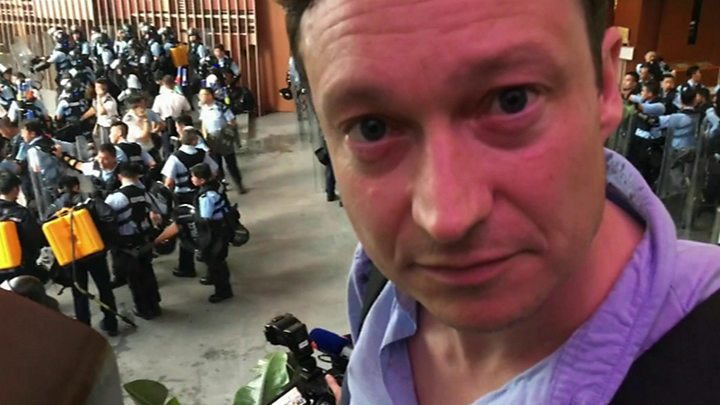
But protesters seem also undeterred, throwing traffic cones and other random objects they can get their hands on.
The BBC's Gabriel Gatehouse is inside the LegCo building where police have effectively barricaded themselves. He reports one officer is injured and was carried away. The doors have been padlocked.
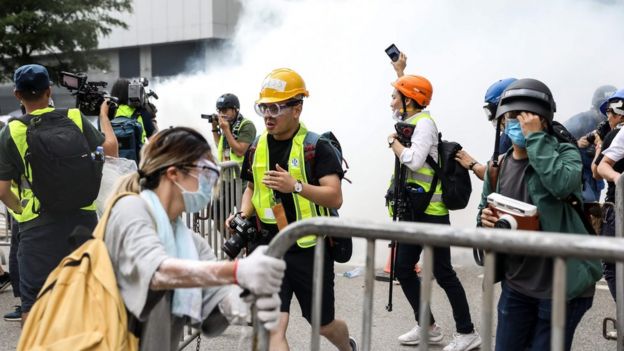 AFP/GETTY
AFP/GETTY
Ambulances are now making their way towards the protest site, according to the Reuters news agency.
Police Commissioner Stephen Lo Wai-chung described the clashes as "rioting", punishable by 10 years in prison, according to the South China Morning Post.
He said police had "no choice" but to use weapons to stop protesters from barging at defence lines.
"We condemn such irresponsible behaviour. There's no need to hurt innocent people to express your opinions.
But one young protester, decked in a black mask and gloves, told news agency AFP that they would not "leave [until] they scrap the law".
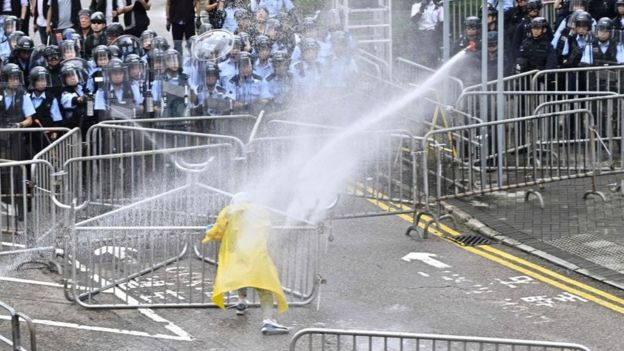 GETTY IMAGES
GETTY IMAGES
Critics of the bill of amendments to the extradition laws cite the alleged use of torture, arbitrary detentions and forced confessions in the Chinese judicial system.
The government has promised legally binding human rights safeguards and other measures it says should alleviate concerns.
Nevertheless, this has led to the largest rallies the territory has seen since it was handed back to China by the British in 1997.
Police said they are also investigating death threats made against Hong Kong's Chief Executive, Carrie Lam, over the bill.

'Test of wills'
By Rupert Wingfield-Hayes, BBC News, Hong Kong
On Harcourt road in central Hong Kong thousands of protesters cheered as volunteers ran forward with goggles and umbrellas - protection against police pepper spray.
Almost all are young and wearing face masks. This is not a sanctioned protest and they fear retaliation or even prosecution.
For now at least the protesters appear to have succeeded. But this is a test of wills. So far the police have stood back allowing the shut down of much of central Hong Kong.
But if the protests continue and the government remains determined to pass the extradition bill many here have told me they fear things here could turn ugly.

Who is involved?
A wide range of groups have spoken out against extradition to China in recent days including schools, lawyers and businesses, with hundreds of petitions also in circulation.
More than 100 businesses have said they will shut to allow their staff to protest for freedom and nearly 4,000 teachers said they would strike.
Powerful business lobbies say they fear the plans will damage Hong Kong's competitiveness as a base of operations.
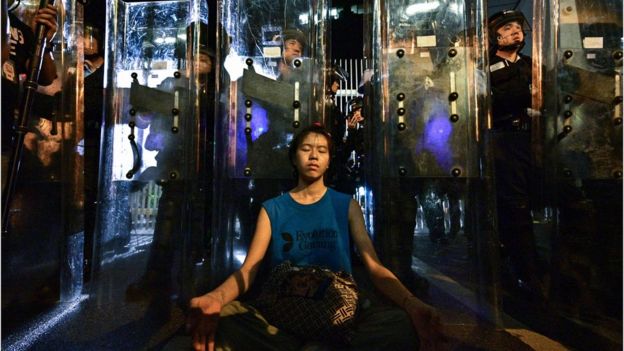 AFP
AFP
On Sunday, organisers say, more than a million people took to the streets demanding the government abandon the amendments, though police estimated turnout was 240,000 at its peak.
What are the proposed changes?
They allow for extradition requests from authorities in mainland China, Taiwan and Macau for suspects accused of criminal wrongdoing such as murder and rape. The requests will then be decided on a case-by-case basis.
The move came after a 19-year-old Hong Kong man allegedly murdered his 20-year-old pregnant girlfriend while they were holidaying in Taiwan together in February last year.
The man fled to Hong Kong and could not be extradited to Taiwan because they do not have an extradition treaty.
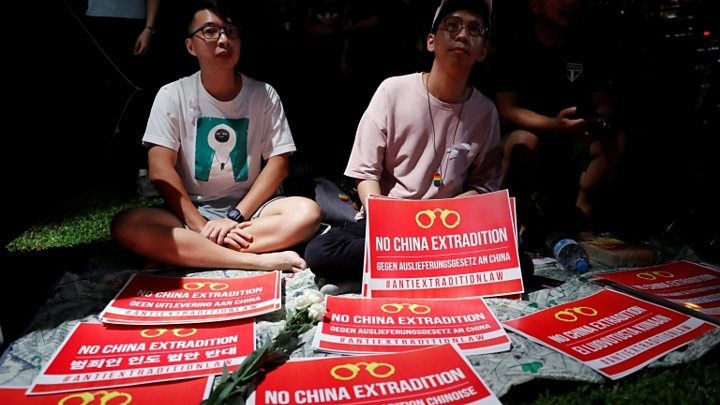
Hong Kong officials have said courts in the territory will have the final say over whether to grant extradition requests, and suspects accused of political and religious crimes will not be extradited.
The government has sought to reassure the public with some concessions, including promising to only hand over fugitives for offences carrying a maximum sentence of at least seven years.
Hong Kong has entered into extradition agreements with 20 countries, including the UK and the US.
Have there been other protests recently?
In 2014, the Beijing government ruled that voters in Hong Kong would only be able to choose their chief executive in 2017 from a list of pre-approved candidates.
Tens of thousands of activists took to the streets demanding change for 79 days. The protests became known as the Umbrella movement after people used umbrellas to shield themselves from pepper spray fired by police to disperse the crowd.
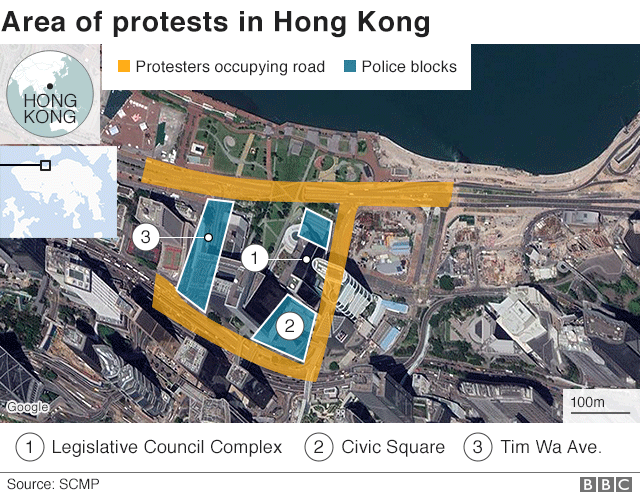 BBC NEWS
BBC NEWS
Despite being mostly peaceful, the protests failed to achieve any concessions.
A number of the protest organisers have since been given jail terms on public nuisance charges.
What is Hong Kong's relationship with China?
Hong Kong was a British colony from 1841 until sovereignty was returned to China in 1997.
Central to the handover was the agreement of the Basic Law, a mini-constitution that gives Hong Kong broad autonomy and sets out certain rights.
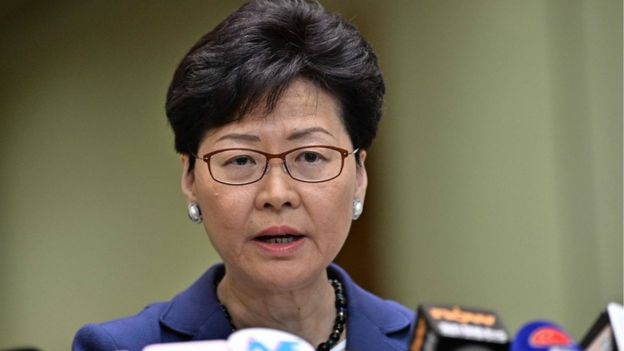 AFP
AFP
Under the "one country, two systems" principle, Hong Kong has kept its judicial independence, its own legislature, its economic system and the Hong Kong dollar.
Its residents were also granted protection of certain human rights and freedoms, including freedom of speech and assembly.
Beijing retains control of foreign and defence affairs, and visas or permits are required for travel between Hong Kong and the mainland.
However, the Basic Law expires in 2047 and what happens to Hong Kong's autonomy after that is unclear.
- LIVE Hong Kong extradition: Protesters and police face off
- Hong Kong protests: Leader Carrie Lam defiant on extradition plan
- Hong Kong extradition protests: Do China demonstrations ever work?
- Hong Kong protesters demonstrate against extradition bill
- Hong Kong-China extradition plans explained
- Hong Kong independence 'a non-starter,' says Convenor

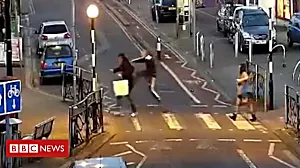
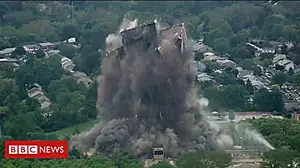
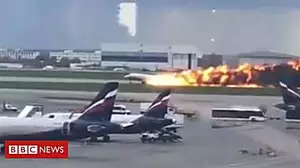
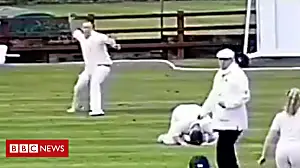

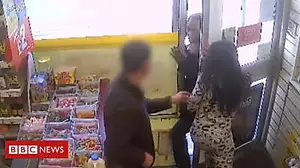
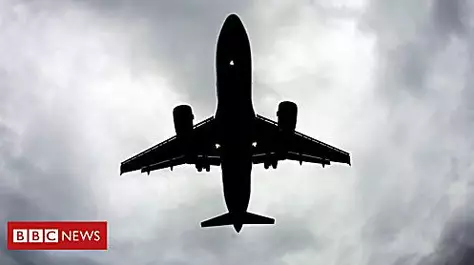
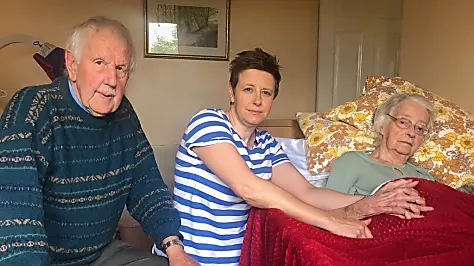



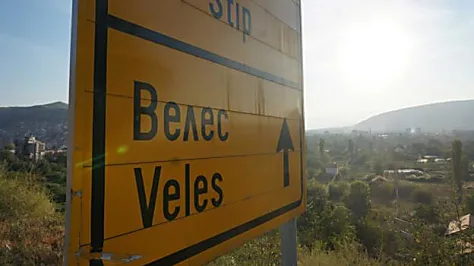



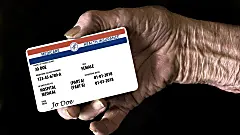

No comments:
Post a Comment